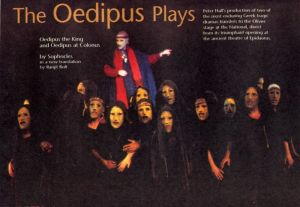|
In Oedipus the King the stage-pictures
are overpowering. Alan Howard's doomed Oedipus occupies a long platform that
juts out over the stage and, at the last, he appears in a hollow-eyed mask
which makes him look like one of Bacon's cardinals. The blind, mud-caked
Tiresias is led on stage by a boy with a rope in an image of Beckettian
dependence. And when the Chorus recognise the horror, a single masked face
turns towards the audience in a state of inexpressible grief.
But Hall also brings out the philosophical
contradiction at the heart of these plays. "Our lives are ruled by chance,"
claims Jocasta; and, in one sense, Oedipus is the victim of fate. But Sophocles
also shows that Oedipus has a restless curiosity and heroic dedication to
truth. In Howard's performance you sense a passionate zeal to know
himself.
The paradox of existence comes out even more
strongly in Oedipus at Colonus where in Dionysis Fotopolous's setting,
the sacred grove is implied by a single Godotesque tree. "Never to have been
born is best by far," cry the Chorus in Sophocles's most quoted line. But the
action is also a tribute to human endurance, to the possibility of loyalty and
affection and to the fact that, while we suffer in the present, "there was
suffering yesterday". Hall's production perfectly preserves that balance
between pain and stoicism.
In short, the plays come alive for a modern
audience. Howard, having articulated a rising arc of emotion in the first play,
in the second brings out the ironic humour underlying Oedipus's suffering. And,
under the masks, there are striking contributions from Suzanne Bertish as the
agonised Jocasta, Greg Hicks as the blindly prophetic Tiresias and Pip Donaghy
as the shiftingly ambiguous Creon. Judith Weir's music also has the supreme
merit of heightening the emotion without overpowering it. But the triumph of
Hall's production is that, while using the methods of antiquity, it makes these
plays accessible and shows how human suffering is constantly countered by
fortitude.
Michael Billington
The Guardian, 19.9.96 |
